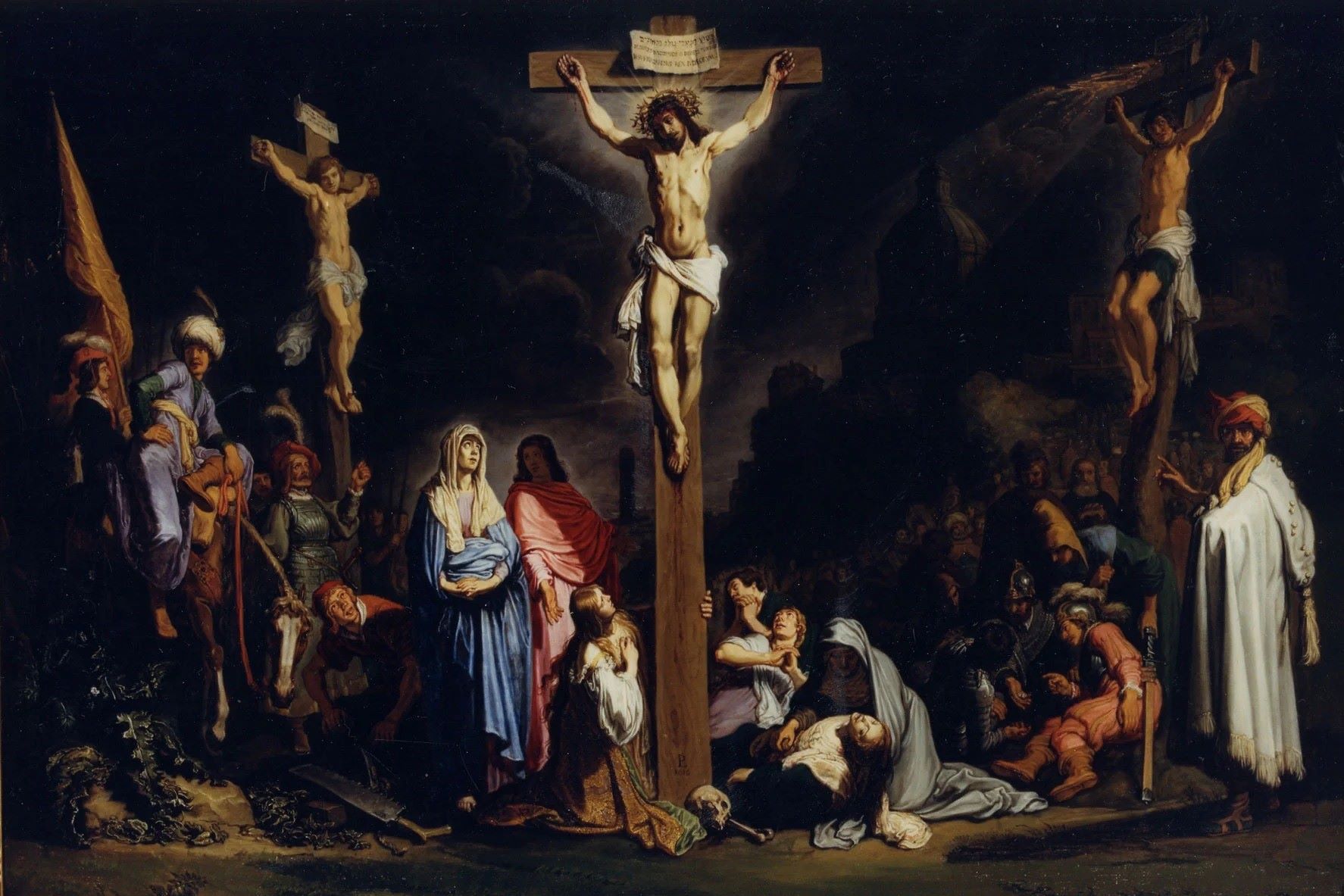Home>Theology and Spirituality>What Lutherans Believe About Communion


Theology and Spirituality
What Lutherans Believe About Communion
Published: February 25, 2024
Ericka Andersen, an editor at Christian.net, expertly merges digital strategy with content creation, focusing on faith and societal issues. Her communication skills enhance the platform's engaging narratives, fostering meaningful dialogue on belief's impact on society.
Discover what Lutherans believe about communion and the theology and spirituality behind this important sacrament. Explore the significance and practices of communion in the Lutheran tradition.
(Many of the links in this article redirect to a specific reviewed product. Your purchase of these products through affiliate links helps to generate commission for Christian.net, at no extra cost. Learn more)
Table of Contents
Introduction
Communion, also known as the Eucharist or the Lord's Supper, holds profound significance in the Lutheran tradition. It is a sacred sacrament that symbolizes the spiritual nourishment and unity of believers with Christ and one another. Understanding what Lutherans believe about communion provides insight into the theological and spiritual underpinnings of this practice.
In the following sections, we will delve into the theological perspectives, historical context, and practical aspects of communion within the Lutheran tradition. From the real presence of Christ in the Eucharist to the role of faith in receiving communion, we will explore the rich tapestry of beliefs and practices that shape the Lutheran understanding of this sacred rite.
As we embark on this exploration, it is essential to approach the topic with an open mind and a willingness to engage with the nuances of Lutheran theology. By gaining a deeper understanding of communion in the Lutheran tradition, we can appreciate its profound impact on worship, community, and spiritual life. Let us journey together into the heart of Lutheran beliefs about communion, seeking to uncover the spiritual treasures that enrich this sacred practice.
The Importance of Communion in the Lutheran Tradition
At the core of Lutheran theology lies a deep reverence for the sacrament of communion. This sacred practice holds profound importance within the Lutheran tradition, serving as a focal point of worship, spiritual nourishment, and communal unity. The significance of communion in the Lutheran tradition can be understood through its roots in the teachings of Martin Luther and its enduring impact on the faith and spiritual life of believers.
Central to the Lutheran understanding of communion is the belief in the real presence of Christ in the Eucharist. Lutherans affirm that, in the act of communion, the body and blood of Christ are truly and substantially present alongside the bread and wine. This belief underscores the profound nature of communion as a means of encountering the living Christ and receiving spiritual sustenance.
Furthermore, communion holds a pivotal role in fostering unity within the community of believers. In partaking of the Eucharist, Lutherans express their shared faith in Christ and their interconnectedness as members of the body of Christ. This communal aspect of communion underscores its significance as a unifying force that transcends individual experiences, binding believers together in a shared spiritual journey.
Moreover, the act of receiving communion is viewed as a source of spiritual nourishment and renewal. In partaking of the bread and wine, believers are reminded of Christ's sacrificial love and are invited to experience a profound sense of grace and forgiveness. This spiritual nourishment sustains and strengthens individuals in their faith journey, offering solace, hope, and a tangible encounter with the divine.
In Lutheran worship services, communion often occupies a central place, underscoring its significance as a sacred ritual that shapes the rhythm and ethos of congregational gatherings. The regular observance of communion serves as a poignant reminder of Christ's presence among his people and the ongoing invitation to partake in the spiritual feast that communion represents.
In essence, the importance of communion in the Lutheran tradition extends beyond a mere symbolic ritual; it embodies a profound encounter with the living Christ, a communal expression of faith, and a source of spiritual sustenance and renewal. This sacrament stands as a cornerstone of Lutheran worship and theology, embodying the rich tapestry of beliefs and practices that define the Lutheran understanding of communion.
The Real Presence of Christ in the Eucharist
Central to the Lutheran understanding of communion is the doctrine of the real presence of Christ in the Eucharist. This theological concept affirms that, in the act of communion, the body and blood of Christ are truly and substantially present alongside the bread and wine. This belief stands in stark contrast to the symbolic interpretation of communion held by some other Christian traditions.
The roots of the Lutheran doctrine of the real presence can be traced back to the teachings of Martin Luther, the 16th-century reformer whose theological insights profoundly shaped the Lutheran tradition. Luther emphasized the tangible, sacramental nature of communion, asserting that Christ is truly present in, with, and under the elements of bread and wine. This understanding, often referred to as "sacramental union," underscores the real and transformative encounter with Christ that takes place in the Eucharist.
In Lutheran theology, the real presence of Christ in the Eucharist is not contingent upon the recipient's perception or understanding. Instead, it is a divine mystery that transcends human comprehension, inviting believers to approach the sacrament with faith and reverence. This perspective emphasizes the profound nature of communion as a means of encountering the living Christ and receiving spiritual nourishment.
The real presence of Christ in the Eucharist serves as a tangible expression of God's grace and love for humanity. Through the act of communion, believers are invited to partake in a sacred feast where they encounter the living Christ and experience the transformative power of his presence. This encounter transcends the physical elements of bread and wine, offering a profound spiritual communion with the divine.
Furthermore, the doctrine of the real presence underscores the ongoing nature of Christ's presence in the life of the believer and the community of faith. In partaking of the Eucharist, believers are reminded of Christ's abiding presence and his redemptive work in the world. This understanding deepens the spiritual significance of communion, portraying it as a sacred encounter that transcends time and space.
In essence, the doctrine of the real presence of Christ in the Eucharist illuminates the profound mystery and transformative power of communion within the Lutheran tradition. It invites believers to embrace the sacrament with faith and reverence, recognizing it as a sacred encounter with the living Christ and a source of spiritual nourishment and renewal.
The Role of Faith in Receiving Communion
The Lutheran understanding of communion places a significant emphasis on the role of faith in receiving this sacred sacrament. Central to this belief is the conviction that faith plays a pivotal role in the reception and experience of communion, shaping the spiritual encounter with the living Christ and the transformative impact of the Eucharist on the believer's life.
In the Lutheran tradition, faith is regarded as the lens through which believers approach the sacrament of communion. It is through faith that individuals perceive the profound nature of the Eucharist, recognizing it as a sacred encounter with the real presence of Christ. This perspective underscores the transformative power of faith in shaping the believer's experience of communion, elevating it from a mere ritual to a profound spiritual encounter.
Moreover, faith serves as the conduit through which believers receive the spiritual nourishment and grace offered in the act of communion. The Lutheran understanding affirms that faith opens the heart and soul to the transformative work of the Holy Spirit, enabling believers to partake in the spiritual feast of the Eucharist and experience the profound impact of Christ's presence in their lives.
Furthermore, the role of faith in receiving communion extends beyond individual experience to encompass the communal dimension of the Eucharist. In partaking of the sacrament with faith, believers express their shared commitment to Christ and their interconnectedness as members of the body of Christ. This communal aspect underscores the unifying force of faith in shaping the collective experience of communion within the community of believers.
The Lutheran perspective on the role of faith in receiving communion underscores the inseparable link between faith and the transformative power of the Eucharist. It invites believers to approach the sacrament with a deep sense of faith and reverence, recognizing it as a sacred encounter with the living Christ and a source of spiritual nourishment and renewal. In essence, the role of faith in receiving communion illuminates the profound impact of belief in shaping the spiritual encounter with the real presence of Christ in the Eucharist.
The Practice of Open Communion in Lutheran Churches
In the Lutheran tradition, the practice of open communion reflects a welcoming and inclusive approach to the sacrament of the Eucharist. Open communion, also known as communion without restrictions, embodies the belief that all baptized Christians, regardless of denominational affiliation, are welcome to partake in the sacrament. This practice stands as a testament to the Lutheran commitment to fostering unity and inclusivity within the body of Christ.
Central to the concept of open communion is the belief that the Eucharist is a means of grace extended to all believers, transcending denominational boundaries and affirming the shared faith in Christ. This inclusive approach reflects the Lutheran commitment to embracing the diversity of the Christian community and recognizing the spiritual unity that transcends doctrinal differences.
The practice of open communion in Lutheran churches is rooted in the theological conviction that the Eucharist is a sacred sacrament that unites believers with Christ and one another. This understanding underscores the transformative and unifying nature of the Eucharist, inviting all baptized Christians to partake in the spiritual feast and experience the real presence of Christ in the act of communion.
Furthermore, open communion reflects the Lutheran emphasis on hospitality and welcome within the faith community. By extending an open invitation to all baptized Christians to receive communion, Lutheran churches embody a spirit of inclusivity and hospitality, affirming the shared identity as members of the body of Christ.
The practice of open communion also serves as a powerful expression of ecumenical unity within the broader Christian community. By welcoming believers from diverse denominational backgrounds to partake in the Eucharist, Lutheran churches exemplify a commitment to fostering dialogue, understanding, and cooperation across denominational lines, emphasizing the shared faith in Christ that transcends theological differences.
In essence, the practice of open communion in Lutheran churches embodies a profound commitment to inclusivity, unity, and hospitality within the Christian community. It stands as a tangible expression of the Lutheran belief in the transformative and unifying power of the Eucharist, inviting all baptized Christians to partake in the spiritual feast and experience the real presence of Christ, regardless of denominational affiliation.
Read more: What Do Lutherans Believe About Baptism
The Significance of Communion in Lutheran Worship Services
In Lutheran worship services, the significance of communion extends far beyond a symbolic ritual; it embodies a profound encounter with the living Christ and a communal expression of faith. The Eucharist holds a central place in Lutheran worship, shaping the rhythm and ethos of congregational gatherings. The act of partaking in communion is a sacred moment that underscores the Lutheran belief in the real presence of Christ in the Eucharist and the transformative power of this sacrament.
The Lutheran worship service, often referred to as the Divine Service, is structured around the celebration of the Eucharist. The liturgy, prayers, hymns, and readings culminate in the solemn and reverent observance of communion. This intentional placement of the Eucharist within the worship service underscores its significance as the focal point of congregational worship, emphasizing the centrality of Christ's presence in the life of the faith community.
Furthermore, the act of receiving communion in Lutheran worship services serves as a tangible expression of the community's shared faith in Christ and their interconnectedness as members of the body of Christ. As believers gather around the communion table, they affirm their unity in Christ and their commitment to the shared journey of faith. This communal aspect of communion fosters a sense of belonging and solidarity within the faith community, reinforcing the bonds of fellowship and mutual support among believers.
Moreover, the significance of communion in Lutheran worship services lies in its role as a source of spiritual nourishment and renewal. Through the partaking of the bread and wine, believers are reminded of Christ's sacrificial love and are invited to experience a profound sense of grace and forgiveness. This spiritual nourishment sustains and strengthens individuals in their faith journey, offering solace, hope, and a tangible encounter with the divine.
In essence, the significance of communion in Lutheran worship services reflects the profound impact of this sacrament on the spiritual life of believers and the collective experience of congregational worship. It stands as a poignant reminder of Christ's presence among his people and the ongoing invitation to partake in the spiritual feast that communion represents. The Eucharist embodies the rich tapestry of beliefs and practices that define the Lutheran understanding of communion, shaping the worship experience and nurturing the spiritual life of the faith community.
Conclusion
In conclusion, the Lutheran understanding of communion encompasses a rich tapestry of beliefs and practices that underscore the profound significance of this sacred sacrament. From the theological conviction of the real presence of Christ in the Eucharist to the emphasis on faith as a transformative force in receiving communion, the Lutheran tradition offers a deeply nuanced and spiritually enriching perspective on this central aspect of Christian worship.
The practice of open communion in Lutheran churches reflects a commitment to inclusivity, unity, and hospitality within the Christian community, transcending denominational boundaries to affirm the shared faith in Christ. This inclusive approach embodies the Lutheran belief in the transformative and unifying power of the Eucharist, inviting all baptized Christians to partake in the spiritual feast and experience the real presence of Christ, regardless of denominational affiliation.
Furthermore, the significance of communion in Lutheran worship services extends far beyond a symbolic ritual; it embodies a profound encounter with the living Christ and a communal expression of faith. The intentional placement of the Eucharist within the worship service underscores its centrality as the focal point of congregational worship, emphasizing the profound nature of communion as a means of encountering the living Christ and receiving spiritual nourishment.
Understanding what Lutherans believe about communion provides valuable insights into the theological underpinnings and spiritual depth of this sacred sacrament. It illuminates the Lutheran commitment to fostering unity, inclusivity, and spiritual nourishment within the faith community, inviting believers to embrace the transformative power of the Eucharist and the profound encounter with the real presence of Christ.
As we reflect on the significance of communion in the Lutheran tradition, we are reminded of its enduring impact on worship, community, and spiritual life. The Eucharist stands as a poignant symbol of Christ's abiding presence and redemptive love, inviting believers to partake in a sacred feast that transcends earthly boundaries and offers a tangible encounter with the divine. In embracing the Lutheran understanding of communion, we are invited to journey deeper into the heart of faith, unity, and spiritual nourishment, embracing the transformative power of the Eucharist in shaping our lives and communities.














